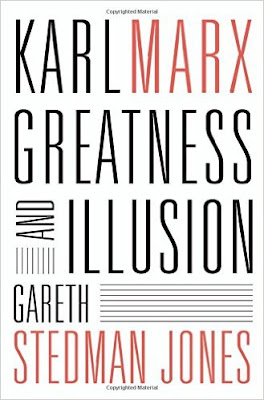 |
| Photo: Peter E. Gordon |
 |
| Marx in 1875. Photo: Wikipedia, the free encyclopedia. |
If anything is certain,” Karl Marx once declared, “it is that I myself am not a Marxist.” This remark, though often quoted, is rarely understood with the depth it demands. The 20th-century intellectuals and party ideologues who proudly called themselves Marxists typically had a clear sense of their doctrine: Marxism as they conceived it was a theory of society that pulled away the mystifying veil of capitalism to reveal the economic exploitation at its core. It promised a bracing and universal concept of human history that portrayed class conflict as the final engine of change. More than this, it served as the modern name for an ancient but enduring dream: to put an end to unfreedom, and to “wipe the tears off every face”.
It was this notion of Marxism that the historian Isaiah Berlin ascribed to its founder when he wrote of Marx that “his intellectual system was a closed one, everything that entered was made to conform to a pre-established pattern”. This is doubtless true of the so-called “dialectical materialism” that became doctrinal orthodoxy in the Soviet Union and its satellite states. Suspicious of all heretics even to the point of airbrushing their faces from history, Eastern-bloc Communist leaders had little patience for the niceties of philosophical speculation.
For them Marxism was not an interpretation of society but an objective science, fixed in its laws and determinist in its theory of historical change. As evidence they could cite Marx’s colleague Friedrich Engels, who in his 1883 graveside speech for his deceased friend said, “Just as Darwin discovered the law of development of organic nature, so Marx discovered the law of development of human history.”
Setting aside the fact that Darwinism is antideterminist, Marxism’s alleged status as a natural science has been hard to shed. In the lands where Marxism became a warrant for one-party rule, it was turned into a cudgel to wield against enemies whose opinions were declared objectively false. But Marx the man was rather more improvisatory in his thinking than the official ideologies that later borrowed his name.
“Karl Marx: Greatness and Illusion”, by the British historian Gareth Stedman Jones, has many virtues, among them a graceful style of narration that will guide even readers unfamiliar with 19th-century history through the period’s political controversies. Stedman Jones has a keen grasp of intellectual history, and skilfully conveys the various themes in philosophy and economics from which Marx forged his own ideas. He has written the definitive biography of Marx for our time.
Stedman Jones’s Marx is a man who was responsive to the political world and capable of changing his mind, sometimes in dramatic ways. The Marx of later legend was (in Stedman Jones’s words) “a forbidding bearded patriarch and lawgiver, a thinker of merciless consistency with a commanding vision of the future”. Although this was the hero who would later be chiselled in stone (think of the hulking statues of Marx and Engels in Berlin), it was not the historical person. Eager that we distinguish between the individual and the ideology, Jones calls his subject “Karl”, a whimsical device that rescues him from “Marxism” (a term that Jones wraps in scare quotes).
Karl was born in the Rhineland town of Trier in 1818, during an age of reaction. Yet memories of the French Revolution remained strong. Karl’s father, Heinrich, a lawyer and a baptised Jew, was known to sing the “Marseillaise” at the local club. His son, more radical in outlook, chafed at the conservative policies of the Prussian government and while a student in Berlin attached himself to the radical circle of “left Hegelians”. Karl was a contributor to “Rhenische Zeitung”, a liberal newspaper, and fled the Rhineland when state censors forced the paper to close. In the aftermath of the 1848 uprisings, he resettled with his family in London, where he wrote bitter essays on the failure of the mid-century revolution and the unexpected rise of the demagogue Louis Napoleon.
Read more...
Additional resources
Karl Marx - Wikipedia, the free encyclopedia
 |
| Karl Marx: Greatness and Illusion |
Source: gulfnews.com











